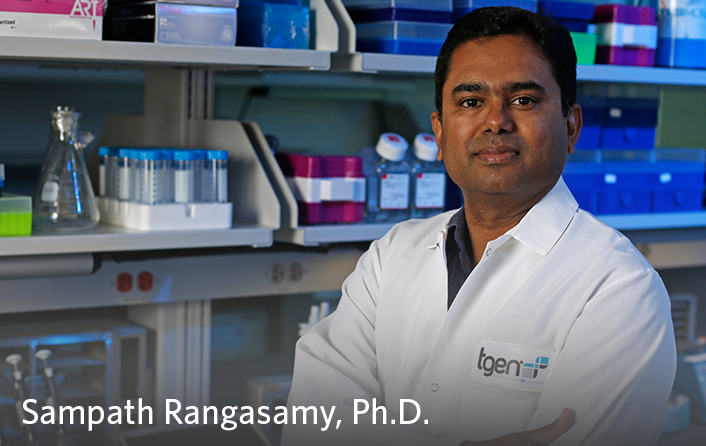
-
- Posted Wednesday August 16, 2023
Study Links Inherited Mutations to Okur-Chung Neurodevelopmental Syndrome
PHOENIX, AZ – August 16, 2023 — Okur-Chung neurodevelopmental syndrome (OCNDS) has long perplexed the medical community with its varied manifestations and genetic origins. A recent study, led by researchers at the Translational Genomics Research Institute (TGen), part of City of Hope, has revealed insights into the hereditary aspects of OCNDS, shedding light on the genetic underpinnings and potential implications for affected families.
OCNDS, a rare autosomal dominant disorder, is characterized by developmental delays, intellectual disabilities, hypotonia, distinctive facial features, and delayed speech. In a study published in Clinical Genetics, researchers provide evidence of inherited CSNK2A1 variants in families with OCNDS, opening new avenues for diagnosis, genetic counseling, and clinical management.
The research team identified three families with OCNDS, where affected parents and children exhibited characteristics consistent with previously reported cases. Utilizing advanced whole exome sequencing (WES) analysis, the study pinpointed specific mutations, or changes, in the CSNK2A1 gene responsible for OCNDS. Notably, Family 1 carried a maternally inherited heterozygous mutation, while Family 2 showcased a paternally inherited mutation and Family 3 exhibited a maternally inherited CSNK2A1 mutation.
“Our findings provide a deeper understanding surrounding the hereditary nature of OCNDS. This study not only expands our knowledge of the syndrome’s genetic basis but also underscores the importance of comprehensive genetic testing for accurate diagnosis and personalized management,” said Sampath Rangasamy, Ph.D., a Research Associate Professor in TGen’s Neurogenomics Division and one of the paper’s senior authors.
While developmental delays and intellectual disability were present in all families, the severity of symptoms varied. Behavioral problems, such as autism spectrum disorder, stereotypic movements, aggressiveness, tantrums, and attention deficit disorder, were observed in Families 1 and 3, highlighting the complexity of how each case presents.
By identifying inherited CSNK2A1 mutations and precisely explaining the variability within families, the research contributes to improved disease understanding, enhanced genetic counseling, and more effective clinical strategies. With the growing utilization of next-generation sequencing, researchers anticipate identifying additional families and individuals with OCNDS, ultimately leading to improved care and support for those affected.
Support for this study came from the CSNK2A1 Foundation.
# # #
About TGen, part of City of Hope
Translational Genomics Research Institute (TGen) is a Phoenix, Arizona-based nonprofit organization dedicated to conducting groundbreaking research with life-changing results. TGen is part of City of Hope, a world-renowned independent research and treatment center for cancer, diabetes and other life-threatening diseases. This precision medicine affiliation enables both institutes to complement each other in research and patient care, with City of Hope providing a significant clinical setting to advance scientific discoveries made by TGen. TGen is focused on helping patients with neurological disorders, cancer, diabetes and infectious diseases through cutting-edge translational research (the process of rapidly moving research toward patient benefit). TGen physicians and scientists work to unravel the genetic components of both common and complex rare diseases in adults and children. Working with collaborators in the scientific and medical communities worldwide, TGen makes a substantial contribution to help patients through efficiency and effectiveness of the translational process. Follow TGen on Facebook, LinkedIn and Twitter @TGen.


